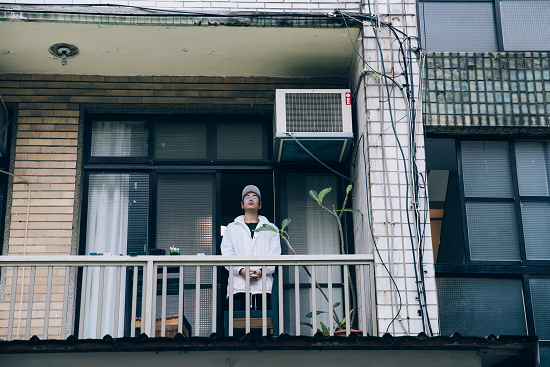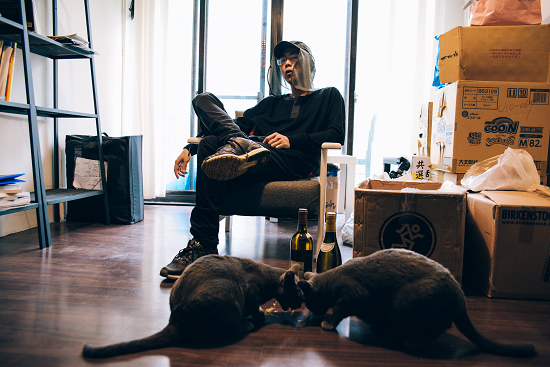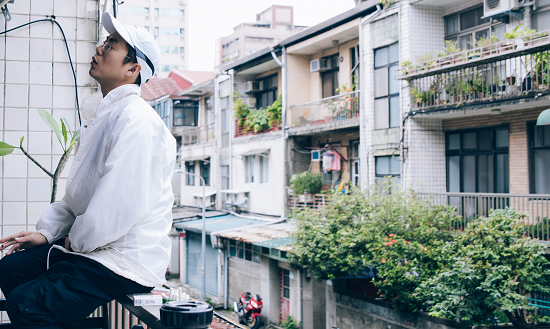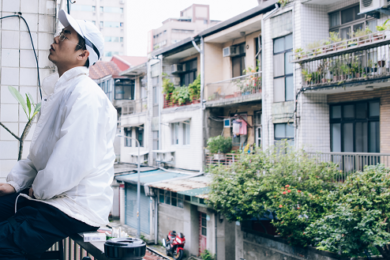Photos by Ash Lin
For the last five years, Howie Lee has been dreaming up an island. It is inspired by three places. The first is Ko Chang in Thailand, to which the producer travels at least once a year. Known as ‘Elephant Island’ for the way it resembles the shape of the animal when viewed from above, it’s scenic, covered with jungle inland and dotted with sleepy villages and resorts on the coast. The second is Hainan Island, which makes up the majority of China’s smallest and southernmost province and is where Lee makes the most of warm winter weather at his mother’s apartment – she’s one of a number of older people who relocate there in the colder months. The third is Sicily; YouTube algorithms have been sending Lee an unusual amount of Italian folk music. “It gave me a lot of inspiration. Even the word ‘Sicily’ sounds refreshing,” he says on a video call.
Inspired by the tropical birdsong that peppers the tranquillity of Ko Chang and Hainan, and by a fantastical, imagined version of Sicily that emerged through those folk songs, the idea for Lee’s new album Birdy Island emerged. He envisioned an island floating in the sky, a near-future theme park built by a Chinese investment company hoping to ‘re-sync’ our relationship with the natural world, an environment populated by birds and ancestral spirits. “No matter if I’m speaking Chinese or your language, all pre-language comes from nature, we got a lot of our tongue from birds,” he says. “I feel like a lot of accents we have are from copying the birds. It’s kind of pre-human but also very post-human.” He casts himself in the role of composer, hired by the investment company to provide a soundtrack to this strange, in-between place.
The success of Lee’s music on Birdy Island is its own act of balance. Just as on his imagined island, investment companies and theme parks mingle with animals and ancient spirits, the music sways hypnotically between the organic, the electronic and the cosmic. Beneath the teeming organic canopies of sound created by interwoven traditional melodies can be found throbs of bass like a tectonic plate moving far below, or skittering footwork rhythms like falling soil. A four-piece choir Lee formed remotely with Chinese vocalists West By West, Fishdoll and Yehaiyahan adds a brushstroke of humanity. Subtle electronic manipulations of those vocals and of birdsong hint at the artificiality of the investment company’s plans.
Juxtaposing styles have long been Lee’s modus operandi. On last year’s 7 Weapons Series, loosely based around the martial arts stories of novelist Gu Long, he clashed modern production against Chinese folk for an album that often thrived off the severe contrast between the two, allowing sinuous traditional melodies to flutter on the updrift from thudding beats. On Birdy Isand, however, he blends the two into something softer and more beautiful. “I think a lot of my older albums have too many ideas,” he says. “It’s too much pressure, too much information in this cultural collage I’m trying to bring. I’m trying to speak too much. For this album I think I’m getting a bit more mature. Maybe it doesn’t go to a lot of places, it’s this little narrative, but it’s calming.” When he performs live, “people say ‘I don’t know if I should listen or if I should dance,’ because it’s too much information. I mix like 17 songs in one hour, so people say ‘we don’t know what to do!’”

Although the creation of Birdy Island overlapped with that of 7 Weapons – both were completed during the lull of the first coronavirus lockdown – it’s the former’s approach that best reflects Lee’s current lifestyle. As he gets older, the calmer climes of Hainan or Ko Chang are more appealing than the club scene in which he first forged his reputation with the Do Hits label of similarly forward-thinking Chinese producers, and remixes for the likes of Charli XCX and SOPHIE. “I’ve not lived in the city for a long time. I do go out and play shows, but I don’t really like drinking and I don’t really do drugs anymore, so I don’t really know why I’m going to the clubs so late to dance. If I want to dance, I can do it anywhere. When we were younger, you’ve got an ‘against something’, this power from inside. But now I feel like I want to have something more serious.
“I’m getting tired of just very banging sounds,” continues the musician, who is now in his mid-30s. “I do come from this culture of bass music, I still have passion for it, but I want to try it in different places. I think it’s a good time to start something very different from my previous work. I think something is dragging me there, rather than me wanting to go there. It’s come very naturally. ” For Birdy Island Lee worked extensively with traditional Chinese instruments, sourced from his collection of between 20 and 30. “I [also] have a very good friend with a big collection of any instrument that looks weird, things I don’t really know the name of but that sound interesting when I’m trying them out, so I borrowed something from her, too.”
Lee plays all of the music on Birdy Island himself, often recording at a slowed down tempo to compensate for his lack of familiarity with the more obscure instruments and then speeding it back up for the finished song. He’s considered working with professionals better acquainted with the instruments, “but it’s difficult to tell them what to do because I’m not a trained conductor. I discover my lack of language when I’m working with them.” For all Lee’s intent to depart from straight-up electronic music, he still thinks in its lexicon. “The sound is acoustic, but the thinking is still the change of tempo or tune, rather than the change of chords or different notes. With electronic music it’s a very direct emotional gesture, rather than an attuned skill.”

It says much about Lee’s ambition, however, that he hopes to reach the level of those specialists, rather than keep compromising. “I do want to work with trained musicians, it’s difficult, but it’s a very good challenge. I think slowly I will get to that level. Performing with a lot of people just generates this power, this musical energy that is beyond imagination. I do want to work with that. When I’m DJing I’m getting this energy from the soundsystem, but the soundsystem is like riding a big machine horse. Working with a group of people is my goal, but I’m not there yet.”
It’s another way in which Lee is finding something beautiful between two opposites. As his music gets more lush and laid-back, Lee is only getting more ambitious. “There are a lot of things I don’t know. If I’m already successful somewhere it means to me that I’m dead. I don’t want to just be a successful person, I want to explore,” he says. “The only thing I conserve is a healthy spirit. If I wake up and I’m full of energy, then when I sleep, I sleep well.” The music on Birdy Island is easy on the ears, but it’s anything but tame. Rather, through the medium of his island in the sky Lee has created a microcosm of earthly existence itself.
Birdy Island is out now via Mais Um Discos



